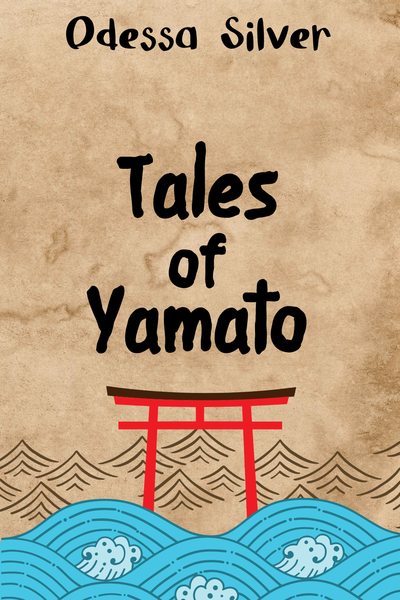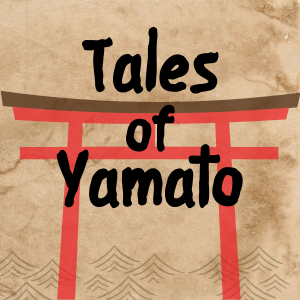The dried ink cascaded down the page with perfectly formed characters, each building together to make yet another haiku. Beneath the sheet lay another and another, stacked up high until it almost toppled. But, before me, sat on the table clean and inkless, was a plain sheet. It had been there for days now. I’d walked away from it a few times, returning again and again, wordless. I sighed. Hitomi, our neighbour, had been looking forward to reading more today whilst her youngest son slept, and I had promised her sweet poetry.
I left the paper behind and opened the shoji screen doors, letting cool air bluster inwards. Perhaps, like the house, I needed fresh air and maybe even a new topic to write about. It was the second month of the year and the last remnants of the winter air still clung on, though soon enough sakura would bloom and I could sit beneath the trees for inspiration. In all my years I’d always found inspiration from the trees and the flowers, how they moved in the wind, petals dancing to a silent tune before falling to the earth. And yet now no words came to me.
In the next room, the tea kettle steamed, and wandered over, knelt, and prepared myself a cup of green tea. Today the kettle felt heavier than normal, and I tried to ignore it. It was just my mind being restless.
The tea sometimes helped with getting ideas, if I was lucky; at the very least it warmed my insides. After taking a sip I took the cup with me outside to the wooden porch, sitting down on the edge, dangling my legs down. I glanced out across at similar houses; we were lucky to afford such a thing here in the city, and I always appreciated it. In the summer I’d sit right here on the porch in the dying light while Masuta lay his weary head on my lap, smelling of charcoal and sweat. All day he spent in the forge, striking metal over and over until it was perfect. I’d gone with him, one time, watching my husband inspect the metal as it slowly formed a new blade. Paper in hand, I’d watched as sparks flew as the hammer struck; the explosive light had inspired my best haiku, although the edges of the paper had burnt a little. Masuta had been amused, though suggested I left the paper and ink at home next time.
That day he’d been forging something for me, a strong blade of a naginata. He spent far too long hammering it into something beautiful, “only the best for his wife,” he’d told me. The blade curved wide at the end, just like a chrysanthemum petal in full bloom. Yet unlike the soft beauty of the flower, this petal would slice flesh and kill. Masuta had crafted the shaft for the blade himself, measuring everything carefully so the tip of the blade sat a hand’s breadth above my head. The most beautiful gift, perfect for protecting our home, and our children… if we had had them. We’d been married for over ten years now, and no children had been birthed alive. The few times I’d managed to become pregnant had left us with tiny, misshapen babies, and one bigger who never drew breath.
For a long time I cried to the gods about my bad luck, begging for just one breathing child. However, it was futile.
Masuta had buried the babies under the kitchen alongside a flower charm I’d bought for our first child. I knew we’d stay childless now. It hurt too much to even think about going through this again. Instead, I’d watched our neighbour Hitomi raise her four sons. I helped out too, when they were very young, but deep inside sat an anger. Why couldn’t I have a son too? Or a daughter who I could wrap in soft kimono? I’d taken my anger to paper, often discarding the half-formed haiku once I’d calmed down. Many couples didn’t have children, for various reasons, and I was just one of them. There was nothing wrong with that…
I found my hand resting on my empty belly.
It had been a long time since I’d written haiku about children.
Sometimes I wish that
we had children to love and
then I would be happy
I snorted. How had that come so easily? I’d made many just like it, however. And Hitomi wouldn’t want to listen to me yet again. I’d cried to her too many times. Sometimes I’d even fallen asleep on her floor, eyes sore and red from all the tears, and her infant sons curled up beside me, dreaming wondrous things.
I sipped at my tea, the hot liquid rolling down my throat almost too much to bear, but I needed the distraction. No matter how many times I tried to take my mind away, how many times I delved deep into something new… I could never work past it. Every time I had a lesson in aikinojutsu, I’d imagined throwing my feelings around, or blocking them from entering my mind again. My teacher had been impressed with my progress, though I hadn’t spoken of what I really viewed instead of pretend attackers trying to infiltrate my home.
Masuta had suggested the martial arts teacher for me, hoping it would give me something else to do than ruminate on our childless life. Now I could protect our home with my hands and with a naginata. Although, so far, nobody had tried.
“Ohayo, Rika.”
Snapping from my reverie, I spotted Hitomi wandering over towards our house, holding the hand of her son Shinji.
“Ohayo,” I replied. “It’s still morning? It feels like late afternoon.”
Hitomi laughed. “You’ve been stuck in your thoughts again, haven’t you? Are you having trouble with your haiku? It’s been a while.”
“Yes,” I admitted and placed my empty tea cup beside me. “But I am sure it’ll be fine. You’ll have more poetry to read soon enough.”
“Good. I enjoy reading every one of them. If you need some inspiration though, Shinji just came back from his first samurai lesson. Soon he’ll spend all day learning and before we know it he’ll be grown up and wielding your husband’s swords.”
“It’ll be a while yet,” I said, chuckling. “He’s still only three years old. He’s more likely to slice his fingers off with a blade than wield them at this age.”
“One day I want to fight with your naginata Rika,” Shinji chimed in.
“Oh? You’ll need to grow really tall for that first.”
“Yes, I’m going to be very tall.”
I smiled. Shinji was Hitomi’s third child, and all were on the path of becoming a samurai. Masuta had already promised each child their own sword by his own hand.
“Yes, you will be, if you follow your father,” Hitomi said, shaking her head. “Why don’t you come over to my house Rika? We can chat and get some ideas for your next haiku.
I smiled again, this time forced and hollow. I couldn’t spend time around her children, not right now.
“That would be lovely. I would like to try writing a haiku about Shinji first, perhaps I can write one all about all his future accolades.”
“Oh? Did we give you an idea already? Well then, we’ll leave you to it. Come and see us later instead. I’m sure Shinji would love to hear all about the swords Masuta has been creating again.”
“He tells me he has a great commission coming soon, I’ll let him tell you both all about it.”
Hitomi nodded, and I could tell her smile was as forced as my own. “Until later then.”
I waited until both walked over to their house and slipped through the shoji door, out of sight before releasing a sigh. I loved Hitomi and her family, she was a dear friend to me, however my heart ached too much today. Instead I’d stay here inside, alone with my thoughts. The haiku returned to me and I found myself heading towards the paper. The blank piece still sat patiently, ready for ink.
Alright, I will do it.
Sitting at the low table, I grabbed my ink stone and a half used ink stick. A few drops of water into the ink stone and I pressed the ink stick down, rotating it around and around, watching as the ink came to life. Once the water was saturated in the black ink, I dipped the brush in and put it to the paper.
Breaking heart, cold and…
By the time Masuta returned home, I had written four more haiku, all about our non-existent children.
“Tadaima, Rika,” he said entering through the shoji door.
“Okaeri,” I greeted, and placed my brush down.
“Oh, you’ve been writing more haiku?” Masuta walked in and embraced me in a tight hug. “I knew your inspiration would hit again. Didn’t I tell you. What was it this time? The sunset was beautiful this evening, was it that?”
I chuckled at his insistence and rested my head against his chest. Again he smelt of warm fire and cloying smoke; on his cheek he’d missed a smear of charcoal, I reached up and brushed it away.
“I didn’t see the sunset tonight, I’ve been sat here at the table writing. I’m not happy with them today but… at least I can write again.”
It was a folly hoping he would just accept that and not try to read them, and for a moment I thought he would, however, releasing me, he bent down and grabbed the sheets, reading through so many half-finished haiku.
“Rika…”
“I know, I know.” I stared at the tatami floor. “I just ended up thinking, and then Hitomi came over with Shinji. Did you know he went to his first samurai lesson today, he’ll be grown in no time.”
Masuta returned to me and wound his arms around my sides, holding me tighter than before. He didn’t need to say anything, not really. He’d held me just like this every time we’d spoken or thought about the lost children. I too held him in return the day he buried the children under the kitchen. He’d cried into my kimono for the morning and we’d lay on the futon holding each other. As soon as the sun rose high in the sky, he stood up and returned to the forge as if the morning never happened. And since, he’d only held me.
“Why don’t we take your mind off these things and go travelling? It won’t be long until the next festival, and we could choose another city or town to visit.”
I shook my head. “You can’t travel any time soon, husband. There are many swords to be made, and demand has increased lately. It would take a week to travel and return, if the weather allowed for it.”
“I can’t let you stay home with these thoughts,” he replied, caressing my hair. “A new city might inspire you better.”
“Perhaps in the summer, when the forge becomes too unbearable to stand in. I’ll be fine for now.”
Masuta frowned a little, but didn’t say another word. I buried my face deeper into his kimono, feeling his strong chest and equally as strong heart beating underneath. My husband was the strongest man I’d ever met.
The next day brought heavy rain. It was grey and dull, mirroring my own feelings. I’d barely slept, laying wide awake, unable to drift off while Masuta snored softly beside me. It wasn’t until the sun started brightening the sky again that I slipped into a light sleep. It had taken all my energy to drag myself out of the futon and begin airing it ready for the evening. I wanted to just lie there, curled up in the warmth, trying to forget about yesterday. Masuta had encouraged me to wake up before he left for the forge, so for him, I did.
Yawning, I made my way over to the tea kettle and knelt down. I froze. Next to the wall sat a bowl up on a small table. I rushed over on my hands and knees, staring at the slices of peach laid out carefully. Next to the bowl was a long slip of paper covered in text; I didn’t have to read it to tell it was Masuta’s handwriting, he always pressed a little too hard with the brush, making his more complicated kanji hard to make out. The ofuda had been written on a long time ago, the edges had folded and leaning forward, I could smell charcoal. Had Masuta held onto this for a while? What was he doing now? Was this a reminder for me or…?
I sat back exhausted. Part of me wanted to go to the forge and ask him, grab his chest, and fall deeply back into his comforting arms. I couldn’t, however. I would only get in his way. I’d have to wait.
As I planted my hand on the tatami to stand, I frowned. There by the table leg lay a small bird, legs up in the air, obviously fallen. I reached for it, holding the toy gently. Many details had been stitched into the soft body, and unlike the ofuda, was new.
Why would he buy something new?
Back to the ofuda. My eyes scanned the cascading kanji inked with Masuta’s wishes. I thought he would have just wished for a child, for luck for…
It had been amended. Fresh ink ended the text, the same I’d used for my haiku. Ice ran through my veins as the room crashed down around me. The table was at an odd height. I’d thought nothing of it. But…
It was at a child’s height.
The perfect height for a child to reach the fruit and play with the toy.
This shrine was to summon a child. And with me unable to carry, there was only one type left.
Zashiki warashi.
Masuta wanted to encourage one to us, a spirit child, to bring us luck and take my mind from our past children. But what was he thinking? I would never forget them; they were right here in this house.
I did not want a replacement.
Fire now coursed through my veins and I snatched the bowl, hurrying to the shoji door, pulling it wide, and throwing the peaches to the ground. The birds could eat them. And the toy bird? I still gripped it in my fist. I’d give it away to Shinji as a good luck charm, he would need it growing up in this turbulent city. And when Masuta came home later, I’d be waiting.











Comments (0)
See all